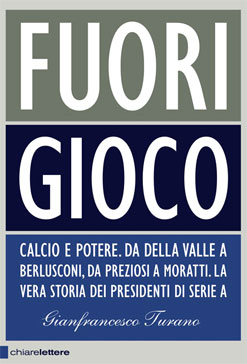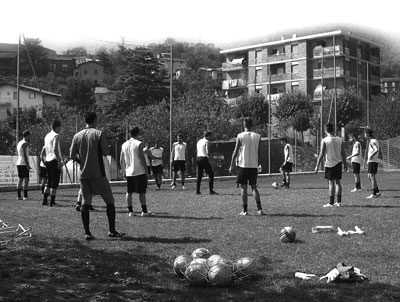| 1.
For fifteen years I was a football coach. I am not a former football player, but football has always been the object of my interest in spectator - often for strictly scientific reasons, considering the fact that over the years, I have written four books on the subject which, although based on language models, should be classified as technical. The role of the coach I played for the first time - it was the late sixties of last century - when a group of my former students asked me to prepare them to participate in a tournament leading them during games. It was after this tournament that I was presented with a solemn figure from the nose in the air, all pious and complacent self, which, praising what he had seen my work in the field, he asked me if I wanted to continue doing the 'coach for its football club which, in fact, he was the "President". I soon discovered that the company in question was one of the most dilapidated neighborhood of Milan's San Siro and the gentleman in question - as President - are directly employed to wash the shirts, mending socks, inflate the least worst of the few and very heavy balls, clean up a "home" located in the basement of the tenement that had been assigned to direct the training and, above all, try to put something together for dinner for himself and his mother ultraottuagenaria that - a bit 'like Tony Perkins Psycho - to have said. Despite this - indeed, of course - I said yes. I had a job - a job that made little - and yes I just made ââa little poorer.

2. In Fuori gioco (Chiarelettere, Milan 2012), Gianfrancesco Turano looks at the world of football focusing on the figure and the history of the Presidents. Between "officially" Presidents and Presidents at heart, he selects ten of the great representativeness: the new owner of the Roma, Thomas Di Benedetto, one of Lazio, Claudio Lotito, the Napoli, Aurelio De Laurentiis, one of Fiorentina, Andrea Della Valle, of what? Udine, Giampaolo Pozzo, that of Juventus, Andrea Agnelli, one of Inter, Massimo Moratti, that of Palermo, Maurizio Zamparini, that of Genoa, Enrico Preziosi and, last but not least, that of Milan, temporarily deprived of the title of "Premier" Silvio Berlusconi. Turano tries to reconstruct its history and everything is not always easy, because someone, as we do, going back, there seems to be a point that would seem insurmountable. As often happens with the powerful in general, even with certain potent calcium must be satisfied - feeding the suspicion that the official biography, with all its obvious shortcomings, hidden shadows that someone has been busy since we remain in the shadows . The fateful moment when, where and why, I got the money - lots and lots to buy a football club that level - in short, remains well hidden, in the unknowable and ineffable. Nevertheless, I would say that the effort was worth Turano be completed: hypocrites certain assumptions - such as those related to the so-called "autonomy of sport" - are dissolved and, of football, we understand the inescapable interdependence - with reasons of political and economic order, with anthropological reasons, with those local logic that characterizes our country and make it a cornerstone of the dominant ideology.

3. I've missed something on a purely psychological. Beyond the different reasons why each of the ten players in the book Turano - reasons most intimate and personal than they can be represented by the money - there is something common not only among all of them, but also among them and Presidents with whom I had directly to do me in my short career as a coach - even with that scalcinatissimo which played all right but all the functions of an organic whole company. I'd like to dig in the processes related to the formation of their own cultural identity and thus the keys to understanding the ways in which he publicly express their power - or persuasive forms dissuasorie towards their subordinates, threats and anger of sporting defeats paternalistic or the joy of victories, interviews and interviews elusive escaped, and the helplessness of the autorevolezze simplest of fans. Why do not you think it's easy to see - as in the practice of game played - who really is "offside" and who is not, who moves with wireless computing, and who, in an attempt to do so, s'irretisce alone and, like any naive of us, rather than move, move.
 Felice Accame
Felice Accame
|

